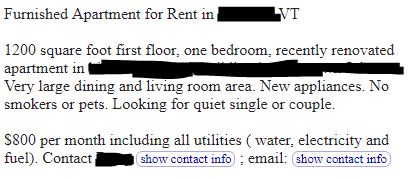
At first glance, this looks like a typical Craigslist rental ad. It describes the apartment, lists amenities, and includes the rent and information about utilities. It also breaks the law.
The landlord, by stating that s/he is “Looking for a quiet single or couple,” is discriminating against potential tenants based on familial status.
The federal Fair Housing Act prohibits discrimination in housing-related transactions, including advertising, based on race, color, religion, national origin, sex, disability, and familial status (known as “protected classes”). Vermont has additional protections based on age, marital status, sexual orientation, gender identity, and receipt of public assistance, along with denial of development permitting based on income of prospective residents.
Fair housing law does not apply to all properties and all situations (see Vermont exemptions here). However, advertisements for housing or statements made about housing by those renting-out or selling housing are almost always covered.
If you experience discrimination in housing or see advertisements like the one above with discriminatory language, contact the Vermont Human Rights Commission (800-416-2010) or Vermont Legal Aid (800-889-2047).
And if you are a landlord, there are some simple rules of thumb to make sure you are in compliance with the law:
- Focus on the property and the amenities in your rental listing description — NOT on who you think an ideal renter would be
- Treat all applicants and tenants equally
- Respond to all requests in a timely manner
- Do not ask if the applicant has a disability, the nature or severity of a disability, questions that would require disclosure of medical condition or history, or whether the person can live independently
- Let parents decide if they want children to share a bedroom
- Service animals are a reasonable accommodation even if you have a “no pets” policy
- The prohibition against disability discrimination includes people with physical disabilities, cognitive and emotional disabilities, and those in recovery from addiction.
The National Fair Housing Alliance has additional resources for making sure advertising is in compliance with fair housing law. See https://nationalfairhousing.org/responsibleadvertising/ for more info.